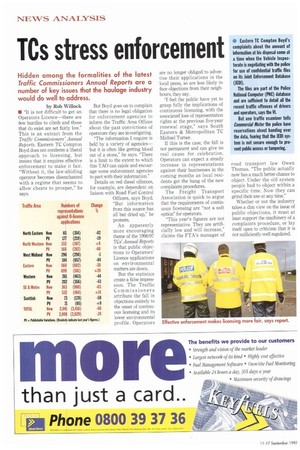TCs stress enforcement
Page 16

If you've noticed an error in this article please click here to report it so we can fix it.
Hidden among the formalities of the latest Traffic Commissioners Annual Reports are a number of key issues that the haulage industry would do well to address.
by Rob WiRock
• "It is not difficult to get an Operators Licence—there are few hurdles to climb and those that do exist are set fairly low." This is an extract from the Traffic Commissioners' Annual Reports. Eastern TC Compton Boyd does not condemn a liberal approach to licensing, but insists that it requires effective enforcement to make it fair. "Without it, the law-abiding operator becomes disenchanted with a regime that seems to allow cheats to prosper," he says. But Boyd goes on to complain that there is no legal obligation for enforcement agencies to inform the Traffic Area Offices about the past convictions of operators they are investigating. "The information I require is held by a variety of agencies— but it is often like getting blood out of a stone," he says. "There is a limit to the extent to which this TAO can cajole and encourage some enforcement agencies to part with their information." Details on red diesel offences, for example, are dependent on liaison with Road Fuel Control Officers, says Boyd. "But information from this source has all but dried up," he protests.
Change
An apparently more encouraging theme of the 1996/97 TCs' Arum] Reports is that public objections to Operators' Licence applications on environmental +20 matters are down.
44 But the statistics 43 create a false irnpres
• sion. The Traffic
+14 Commissioners
▪ attribute the fall in objections entirely to
+9 the onset of continu40
ous licensing and its lower environmental profile. Operators
are no longer obliged to advertise their applications in the local press, so are less likely to face objections from their neizlibours, they say.
"I feel the public have yet to grasp fully the implications of continuous licensing, with the associated loss of representation rights at the previous five-year renewal stage," says South Eastern & Metropolitan TC Michael Turner.
If this is the case, the fall is not permanent and can give no real cause for celebration. Operators can expect a steady increase in representations against their businesses in the coming months as local residents get the hang of the new complaints procedures.
The Freight Transport Association is quick to argue that the requirements of continuous licensing are "not a soft option" for operators.
"This year's figures are not representative. They are artificially low and will increase," claims the FTA's manager of
road transport law Owen Thomas. "The public actually now has a much better chance to object. Under the old system people had to object within a specific time. Now they can grind their axe at any time."
Whether or not the industry takes a dim view on the issue of public objections, it must at least support the machinery of a complaints procedure, or lay itself open to criticism that it is not sufficiently-well regulated.


























































































































